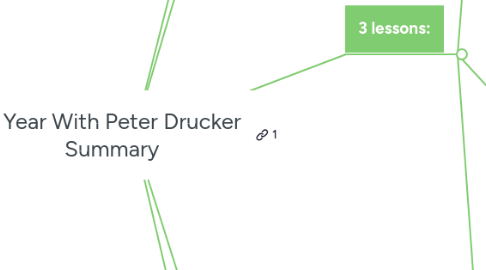
1. 1-Sentence-Summary:
1.1. A Year With Peter Drucker compiles 52 lessons with weekly exercises into one comprehensive, year-long curriculum for managers, leaders, and those who aspire to be one or the other, based on the teachings of the father of modern management.
2. Favorite quote from the author:
2.1. "There is nothing quite so useless, as doing with great efficiency that, which should not be done at all." - Peter Drucker
3. 3 lessons:
3.1. Start using feedback analysis right now, so you can figure out your strengths and weaknesses.
3.1.1. Here's how feedback analysis works:
3.1.1.1. Every time you make a major decision in your life, write down the outcome you expect it will have 6, 12, and 18 months from now.
3.1.1.2. After those periods have passed, simply pull out your original assessment again and see how you did.
3.1.1.2.1. Were you completely spot on?
3.1.1.2.2. Did something entirely different happen?
3.1.2. This simple exercise will help you to see patterns emerge over the years, which will let you figure out what you’re good at, and what you can’t do well.
3.1.3. Only if you’re self-aware can you direct your career efforts where they get you and the world the best results
3.1.4. The earlier you start this practice, the better, because your early career choices will shape your entire professional future.
3.1.4.1. But if you’re already a few years into the game, don’t fret – it’s better to start now than never.
3.2. Work on your skill to concentrate and information literacy.
3.2.1. There are just two crucial skills any great manager must possess.
3.2.1.1. The ability to concentrate your efforts.
3.2.1.2. The ability to understand and interpret data correctly.
3.2.2. Get your company to focus on the areas where it can generate the maximum results.
3.2.2.1. Where is your company most productive, with the least amount of effort?
3.2.2.2. An example:
3.2.3. Also, leave sinking ships early.
3.2.3.1. Don’t keep dying products afloat.
3.2.4. Collecting data is easy. Those who are able to read the data, win.
3.2.4.1. During the 2007 financial crisis, four outsiders made billions, just because they looked into housing bonds, and saw the foul foundation the banks were set up on before the rest of the world did
3.2.5. If you can’t figure out what’s wrong if 15% of your customers demand their money back, you won’t be around for too long.
3.3. Take a sabbatical to develop your skills in the non-profit sector.
3.3.1. Peter Drucker believed in leadership as a good for the world, not just business.
3.3.1.1. He thought leaders and managers are extremely well-positioned to help governments and non-profit organizations as well.
3.3.2. An example:
3.3.3. Do you want to broaden your horizon, train your skills elsewhere and do some good?
3.3.3.1. An executive sabbatical at a government body or non-profit organization is a perfect way to boost your capabilities as a leader.
3.3.4. The reason managers do so well in these environments is because they can take abstract goals, like offering education for underprivileged children, into specific, structured goals, like building 25 schools in Africa, with a concrete action plan and implementation process.
